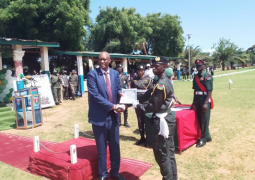
Director Ceesay was speaking on Tuesday during the opening of a four-day training on energy audits organised by the Ministry of Petroleum and Energy with support from the World Bank.
The training, which is underway at a local hotel in Bakau, seeks to enhance knowledge dissemination on energy management in buildings for professionals from private and public sectors.
“As government, together with various actors’ organisations in the economy, is working tirelessly towards providing energy efficiency across the country,” Mr Ceesay said. “We realised that energy is sometimes not efficiently utilised. Meaning, it is not economically used.”
He added sometimes people would leave their houses or offices with their lights or air conditioning on, which is an inefficient use of energy.
“We would continue to advocate as public agencies or people in the energy sector for people to efficiently use these resources, especially, when we talk about renewable energy resources,” he stated.
Matarr Touray, Energy specialist at the World Bank, said the bank has worked tirelessly with colleagues, especially at the Ministry of Petroleum and Energy towards developing and encompassing all of the energy efficiency work programs sprayed across the crosscutting pillars.
“Pillar I of the project was the development of the National Energy Efficiency Strategy (NEES), which was launched in July 2022. This includes the identification of high-impact energy efficiency saving measures associated with framework and developing a robust NEES guideline.”
According to him, Pillar II enables the framework for implementation of the Energy Efficiency Strategy, including relevant capacity building.
“Through this pillar, the legislative and institutional framework redeveloped primarily, revolving around the development of an energy efficiency law, financing mechanisms and business plan for the energy efficiency agency and also mainstreaming gender energy efficiency.”
For his part, E N and Gopal, associate director, Price Waterhouse Coopers (PWC) from India, said he is here to look at the energy performance of public buildings across the Gambia, how efficient they are and how they can become more efficient and save energy.
“We have participants studying across 27 buildings. We have identified close to 40 professionals to train them on energy efficiency improvement performance.”
Mr Gopal added that the training seeks to build the participants' technical and financial capabilities on maksing performance assessment and arriving at serving potentials, adding that this is going to be the first batch which will enable them to go and actually do implementation of the recommendations they have given as part of the study.
Meanwhile, during the first day of the training, participants were taken through the first pillar to combat change on introduction to energy audits, approaches and methodologies for energy audits as well as data collection techniques.
The four-day seminar will showcase studies on innovative and important energy measures and technologies in reducing energy cost in public and private organizations.




